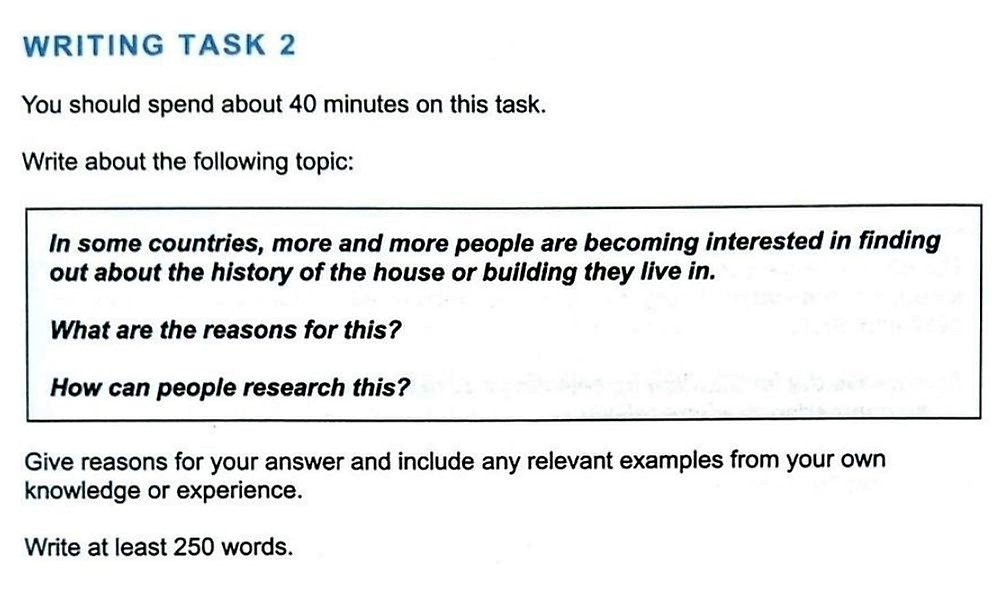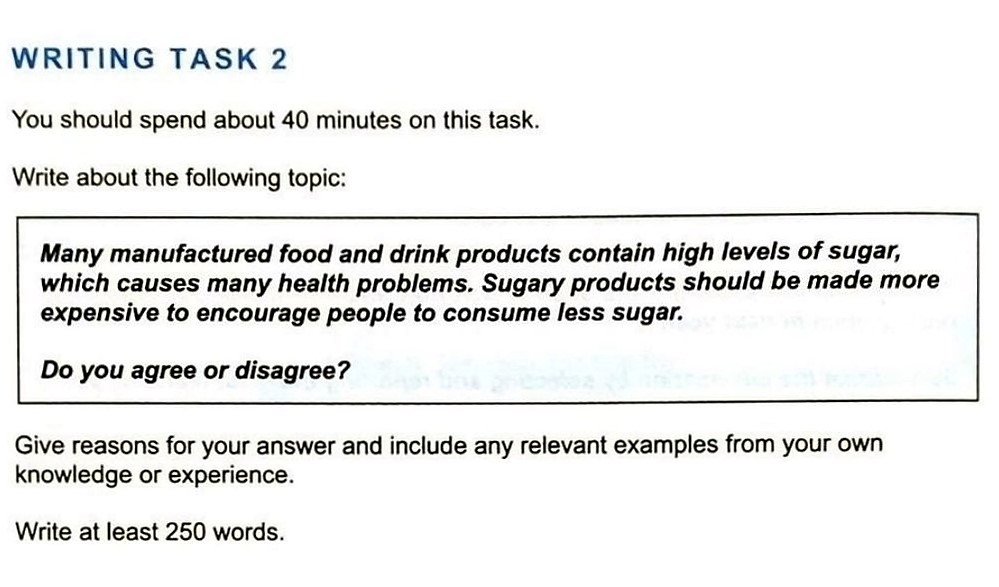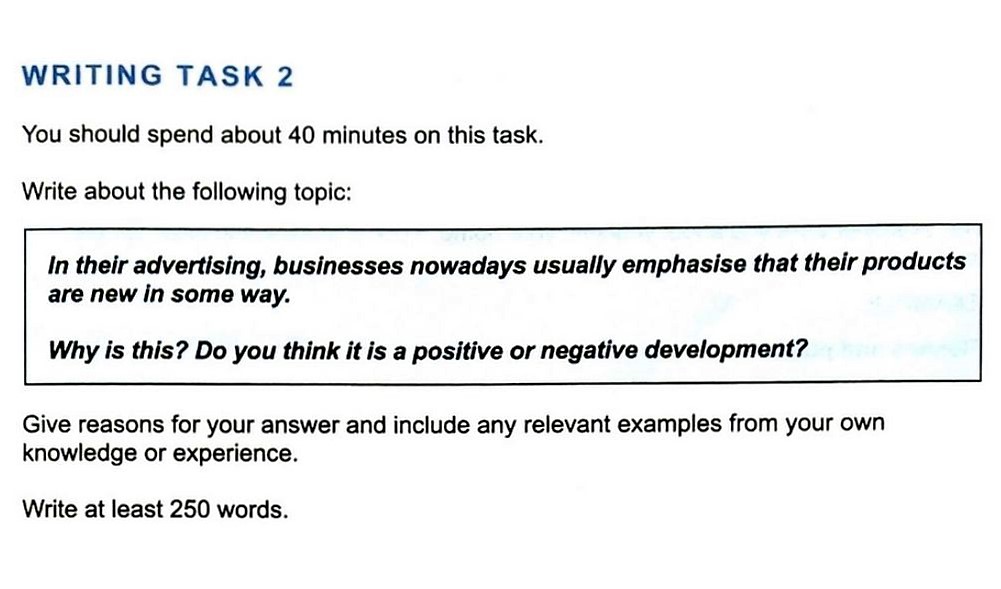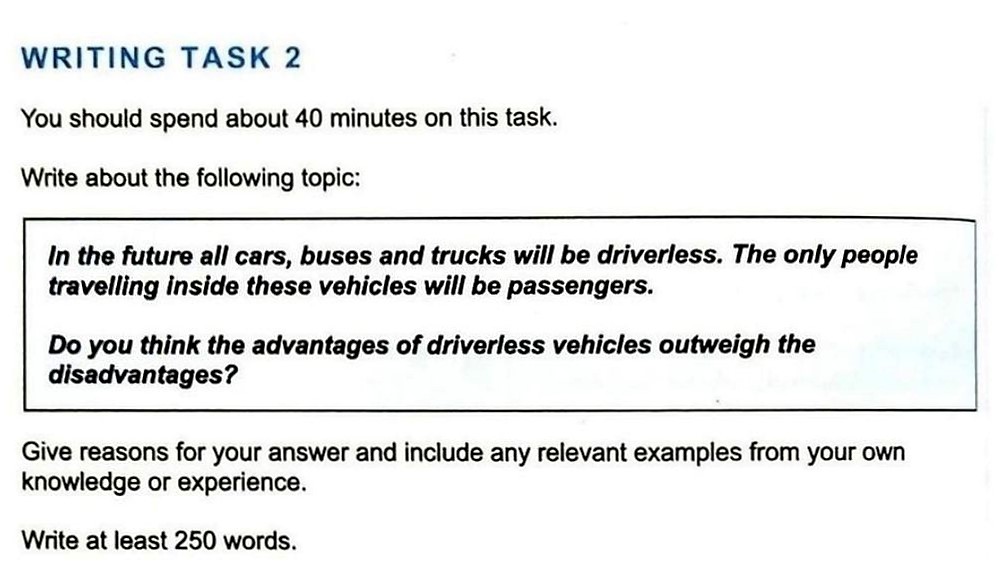IELTS Writing Academic and General Task 2
In Writing Task 2, test takers write a semi-formal/neutral discursive essay of at least 250 words in the answer sheet provided. Writing task 2 is the same for both academic and general training test.
The task instructions give information about a point of view, argument or problem. They then tell test takers how to discuss this, which may involve providing general factual information, outlining and/or presenting a solution, justifying an opinion, evaluating evidence and ideas.
Topics are of general interest, – such as: whether children’s leisure activities should be educational, why families are not so close as they used to be and how they could be brought closer, how environmental problems can be solved, who should pay for the care of old people, whether smoking should be banned in public places.
Test takers should make sure that they complete the task carefully and provide a full and relevant response. They should organise their ideas clearly and make sure to support their argument with relevant examples (including from their own experience where relevant) or evidence. For this task, test takers need to be able to communicate more abstract and complex ideas and use a range of vocabulary and grammatical structures. Task 2 contributes twice as much to the final Writing band score as Task 1. Therefore, test takers who fail to attempt to answer this task will greatly reduce their chance of achieving a good score.
Test takers are asked to write at least 250 words and will be penalised if their answer is too short. They should spend no more than 40 minutes on this task.
Test takers should also note that they will be penalised for irrelevance if the response is off-topic or is not written as full, connected text (e.g. using bullet points in any part of the response, or note form, etc.). They will be severely penalised for plagiarism (i.e. copying from another source).
How to write IELTS writing task 2
Step 1 – read the question and understand what the examiner is asking
Make sure that you understand what question is being asked. One of the worst mistakes you can make is to go off on a tangent and fail to answer the question. IELTS questions are precisely worded and they require a specific answer. Time spent reading the question and understanding the requirements is time well spent. It is the surest way to ensure that you answer the question well.
IELTS is very specific and it is not okay to write about the general topic. Instead the answer must be very specific and pointed.
Common errors
• You completely misunderstand the question
• The question looks like one that you have written in the past. You rewrite the same answer only to find that the question was not the same.
• Your essay is too general and doesn’t answer the question that was asked.
Step 2 – think about what you’re going to write for task 2
This is the stage at which you plan the essay, but you can’t just plan. You must think. Don’t just react with a ready-made essay which may or may not answer the question asked. You need to carefully read the question and decide how you can answer it using your language skills, your experience, and your knowledge.
Of course the essay that you have previously written may offer you some insights, vocabulary and even ideas, but make sure that what you use applies without doubt to the question which has been asked in the exam. It is as important that you consider parts of previous essays to include in the answer as it is to know what parts to exclude.
Common errors
• You set off to write the exam without putting in enough thought and part way through you realize that you haven’t answered the question, or the essay is incoherent. Now it is too late to start again.
• You fail to answer the question asked.
Writing the essay
Every essay should have three parts, so it is useful to consider each part of the essay as a step in the process of essay writing.
Now we have our:
– ideas
– position
– examples
Now we can organise the paragraph, here is a possible structure to follow:
– introduction / topic sentence
– our position
– explanation (WHY)
– example
– paragraph close
Step 3 – writing the introduction
The introduction is an important step in the writing process. It sets the tone and gives the examiner the first impression of your skills and abilities, so if you get the introduction wrong you could start off on the wrong foot.
The introduction should link your answer to the question. You should, therefore, write the introduction considering both the question at hand and the body of the essay that you plan to write.
Common errors
• You don’t link the question properly and identify its contents
• Your position in answering the question is unclear.
Step 4 – developing the essay ideas, your approach, and your explanations
In approaching the main body of the essay, you must ensure that answer that you give is not only clear, and accurately answers the question, it must also be coherent and well-structured. Divide your essay up into paragraphs that explain just one idea per paragraph. Ensure that you explain how your ideas relate to the question.
Common errors
• Your ideas don’t adequately answer the question
• You have not supported your ideas with examples or reasons
• You have given plenty of detail but not made it clear how the details relate to the question.
Step 5 – conclude your essay with a summary that completes the circle
Before you write your conclusion, you need to read through your essay and make sure that it is complete and coherent. Your conclusion should round off your essay and complete it. It should summarise the main points in the body and reflect the connection between the introduction and the question.
A good conclusion summarises the contents of the essay in as few words as possible.
Common errors
• You fail to write a conclusion at all. An essay without a conclusion is, in fact, not an essay
• The conclusion doesn’t summarise the essay or it fails to answer the question.
Step 6 – read your essay
Unlike research papers or essays written as homework, you only get one chance at writing the exam essay. It’s a good idea to read your essay through at various intervals during the exam. Leaving this to the end may be too late. You should also read it once more when you get to the end to ensure that it makes sense and is a coherent whole.




